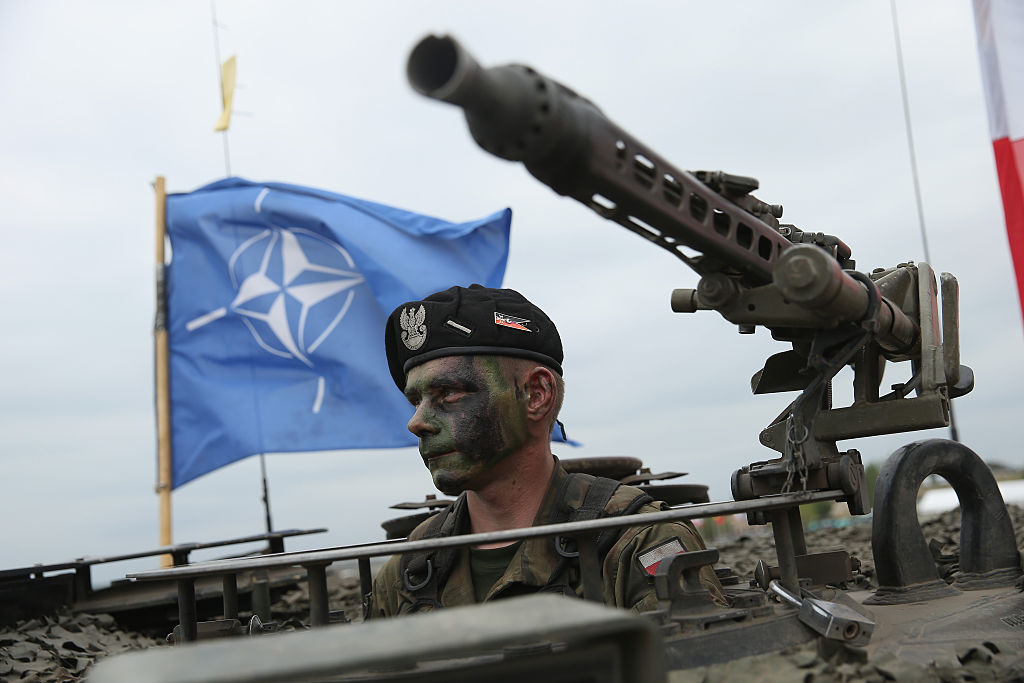Nato stages largest military exercise since the Cold War
More than 50,000 troops are practising air, sea, land and cybersecurity war manoeuvres in Norway

A free daily email with the biggest news stories of the day – and the best features from TheWeek.com
You are now subscribed
Your newsletter sign-up was successful
Nato has gathered together 50,000 military personnel from 31 countries for its largest military exercise since the Cold War, just weeks after Russia and China staged massive joint war games.
Exercise Trident Juncture 18 stretches from the Baltic Sea into Iceland, and will see troops practising air, sea, land and cybersecurity war manoeuvres until 7 November.
Hosted in Norway, the exercise is designed to ensure “that Nato forces are trained, able to operate together, and ready to respond to any threat from any direction”, according to the alliance’s website. The exercise will involve a total of 65 ships, 250 aircraft and 10,000 vehicles, and the participants will take turns playing the role of fictitious aggressor and Nato defending forces.
The Week
Escape your echo chamber. Get the facts behind the news, plus analysis from multiple perspectives.

Sign up for The Week's Free Newsletters
From our morning news briefing to a weekly Good News Newsletter, get the best of The Week delivered directly to your inbox.
From our morning news briefing to a weekly Good News Newsletter, get the best of The Week delivered directly to your inbox.
The exercises will be conducted at training grounds across central Norway in below-freezing temperatures.
“We’ll operate here for the next couple of weeks in what is an unforgiving environment at sea and on land,” head commander Admiral James G. Foggo told Reuters. Foggo is overseeing the operation from USS Mount Whitney, a Blue Ridge-class command ship of the US Navy.
Although Nato sponsors annual military exercises, Trident Juncture 18 far exceeds previous campaigns. “In recent years, Europe’s security environment has significantly deteriorated,” Nato Secretary General Jens Stoltenberg told a press conference earlier this week. “Nato has responded, with the biggest adaptation of our collective defence since the end of the Cold War.”
In the past, the organisation’s military exercises have usually taken place in Central and Eastern Europe, reports The Washington Post.
A free daily email with the biggest news stories of the day – and the best features from TheWeek.com
This year’s geographical shift follows a request from Norway to double the number of US Marines training in the country each year, a move that has been viewed as a response to Russia’s 2014 annexation of Crimea
The Nato military exercise comes a month after Russia held its biggest war games since the fall of the Soviet Union. Conducted in conjunction with China, Vostok-2018 involved almost 300,000 troops, more than 1,000 military aircraft, two of Russia’s naval fleets, and all of its airborne units, according to a statement by Russian Defence Minister Sergei Shoigu.
Nato spokesperson Dylan White told Reuters that Russia had briefed the alliance on the campaign in May.
“Vostok demonstrates Russia’s focus on exercising large-scale conflict. It fits into a pattern we have seen over some time - a more assertive Russia, significantly increasing its defence budget and its military presence,” White said.
-
 Switzerland could vote to cap its population
Switzerland could vote to cap its populationUnder the Radar Swiss People’s Party proposes referendum on radical anti-immigration measure to limit residents to 10 million
-
 Political cartoons for February 15
Political cartoons for February 15Cartoons Sunday's political cartoons include political ventriloquism, Europe in the middle, and more
-
 The broken water companies failing England and Wales
The broken water companies failing England and WalesExplainer With rising bills, deteriorating river health and a lack of investment, regulators face an uphill battle to stabilise the industry
-
 Epstein files topple law CEO, roil UK government
Epstein files topple law CEO, roil UK governmentSpeed Read Peter Mandelson, Britain’s former ambassador to the US, is caught up in the scandal
-
 Iran and US prepare to meet after skirmishes
Iran and US prepare to meet after skirmishesSpeed Read The incident comes amid heightened tensions in the Middle East
-
 Israel retrieves final hostage’s body from Gaza
Israel retrieves final hostage’s body from GazaSpeed Read The 24-year-old police officer was killed during the initial Hamas attack
-
 China’s Xi targets top general in growing purge
China’s Xi targets top general in growing purgeSpeed Read Zhang Youxia is being investigated over ‘grave violations’ of the law
-
 Panama and Canada are negotiating over a crucial copper mine
Panama and Canada are negotiating over a crucial copper mineIn the Spotlight Panama is set to make a final decision on the mine this summer
-
 Trump backs off Greenland threats, declares ‘deal’
Trump backs off Greenland threats, declares ‘deal’Speed Read Trump and NATO have ‘formed the framework for a future deal,’ the president claimed
-
 Why Greenland’s natural resources are nearly impossible to mine
Why Greenland’s natural resources are nearly impossible to mineThe Explainer The country’s natural landscape makes the task extremely difficult
-
 Iran cuts internet as protests escalate
Iran cuts internet as protests escalateSpeed Reada Government buildings across the country have been set on fire